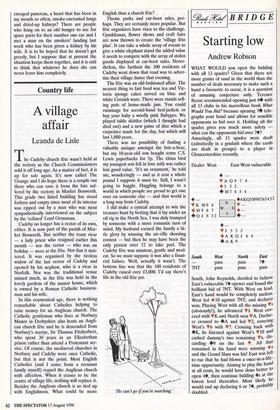Country life
A village affair
Leanda de Lisle
The Cadeby church fête wasn't held at the rectory as the Church Commissioners sold it off long ago. As a matter of fact, it is up for sale again. It's now called The Grange and I do hope there is a couple out there who can save it from the fate suf- fered by the rectory in Market Bosworth. This grade two listed building has stood forlorn and empty since most of its interior was ripped out by a man who was most sympathetically interviewed on the subject by the 'refined' Loyd Grossman.
Cadeby no longer has a rector of its own, either. It is now part of the parish of Mar- ket Bosworth:But neither the team vicar — a lady priest who resigned earlier this month — nor the rector — who was on holiday — were at the fête. Not that it mat- tered. It was organised by the tireless widow of the last rector of Cadeby and opened by his nephew, who is a vicar in Norfolk. Nor was the traditional venue missed much, as the fete was held in the lovely gardens of the manor house, which is owned by a Roman Catholic business- man and his wife.
In this ecumenical age, there is nothing remarkable about Catholics helping to raise money for an Anglican church. The Catholic gentleman who lives at Norbury Manor in Derbyshire also hosts an Angli- can church fete and he is descended from Norbury's martyr, Sir Thomas Fitzherbert, who spent 30 years in an Elizabethan prison rather than attend a Protestant ser- vice. Of course, the mediaeval churches in Norbury and Cadeby were once Catholic, but that is not the point. Most English Catholics (and I come from a recusant family myself) regard the Anglican church with affection. When it ceases to be the centre of village life, nothing will replace it. Besides the Anglican church is so tied up with Englishness. What could be more English than a church fête?
Theme parks and car-boot sales, per- haps. They are certainly more popular. But fête organisers have risen to the challenge. Gymkhanas, flower shows and craft fairs are now thrown to create the 'village fête plus'. It can take a whole array of events to give a white elephant stand the added value it needs to compete with the array of stolen goods displayed at car-boot sales. Never- theless, the farthest the 100 residents of Cadeby went down that road was to adver- tise their village dance that evening.
The fête was an old-fashioned affair. The nearest thing to fast food was tea and Vic- toria sponge cakes served on blue and white Cornish ware. There were stands sell- ing pots of home-made jam. You could rummage for second-hand bed-jackets or buy your baby a woolly pink Babygro. We played table skittles (which I thought had died out) and a new game of dice which a carpenter made for the day, but which will last 1,000 years.
There was no possibility of finding a valuable antique amongst the bric-a-brac, but my 10-year-old son bought some C.S. Lewis paperbacks for 5p. The china bird my youngest son fell in love with was rather less good value. 'It's an ornament,' he told me, wonderingly — and as it cost a whole pound I suppose it must be. Still, I wasn't going to haggle. Haggling belongs to a world in which people are proud to get one over on someone else — and that world is a long way from Cadeby.
I did make a cynical attempt to win the treasure hunt by betting that it lay under an oil rig in the North Sea. I was duly trumped by someone with a more romantic turn of mind. My husband earned the family a lit- tle glory by winning the air-rifle shooting contest — but then he may have been the only person over 12 to take part. The Cadeby fête was amateur, gentle and mod- est. So we must suppose it was also a finan- cial failure. Well, actually it wasn't. The bottom line was that the 100 residents of Cadeby raised over £3,000. I'd say there's life in the old fête yet.
He can't go if you're watching.'


















































 Previous page
Previous page